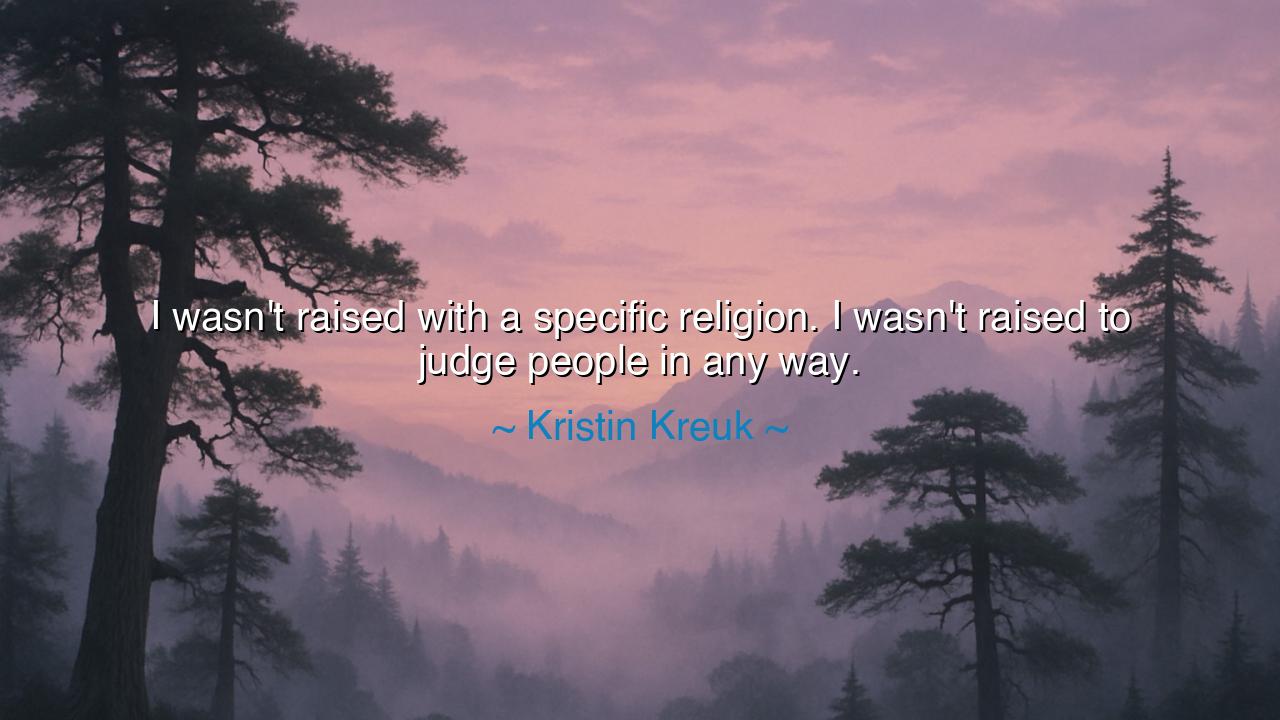
I wasn't raised with a specific religion. I wasn't raised to






“I wasn’t raised with a specific religion. I wasn’t raised to judge people in any way.” Thus spoke Kristin Kreuk, an artist of our time whose words carry a quiet wisdom—gentle, yet profound. In these few sentences lies a teaching as ancient as compassion itself: that the worth of a soul is not measured by creed, but by kindness, not by doctrine, but by understanding. Her words remind us that while religion may guide many to virtue, it is the spirit of nonjudgment—the openness of heart—that defines the truly awakened being. To live without judgment is to live as the ancients urged us: in harmony with others, with humility before the mysteries of life.
The origin of Kreuk’s statement rests not in theological debate, but in the human longing for unity. Throughout history, religion has been both a light and a sword—a force of compassion and, at times, of division. Yet Kreuk speaks not against faith, but against the arrogance that sometimes grows from it—the notion that one path holds all truth, and all others must be wrong. To be raised without a single creed, she suggests, is to see the world without walls, to recognize that goodness can wear many faces, and that love is larger than any single scripture. Her words echo the wisdom of the Stoics and the Buddha alike, who taught that virtue and compassion belong not to one faith, but to the very essence of being human.
In this sense, her quote reflects a spiritual freedom that transcends dogma. The absence of judgment is not the absence of morality; it is its perfection. To refrain from judging others is to see the divine spark within them—to look beyond their beliefs, their customs, their errors, and perceive the shared humanity that binds all souls. The ancients called this equanimity, the stillness of the wise heart that neither condemns nor exalts, but understands. For when we judge, we divide; when we understand, we heal. The path of nonjudgment is the path of peace.
History, too, teaches us this lesson. Consider the story of Emperor Ashoka of ancient India. Once a conqueror drenched in blood, he came to see the suffering he had caused and turned toward compassion. Rejecting the pride of conquest, he embraced the Dharma, not as a religion of exclusion, but as a law of universal respect. On the pillars he raised across his empire, he inscribed these words: “He who honors his own religion and condemns others harms his own faith.” In Ashoka’s transformation, we see Kreuk’s truth embodied—the realization that judgment blinds, but understanding enlightens. His greatness came not from power, but from the humility to see all beings as kin beneath the same sky.
Kreuk’s statement also carries a quiet defiance against the patterns of modern life, where the world so often divides itself into tribes of belief and disbelief, of right and wrong, of us and them. To be “not raised to judge” is to walk against the tide of prejudice—to refuse the temptation to categorize others by creed, race, or background. It is an act of courage, for judgment gives a false sense of control, while compassion requires vulnerability. To live as Kreuk describes is to live with empathy as one’s compass, to seek connection rather than superiority. It is the wisdom of the heart that sees beyond the surface and honors the soul within.
But this path is not one of indifference; it is one of active love. To judge less does not mean to care less—it means to care more deeply, without conditions. When we release the need to judge, we make room for truth to enter. When we look upon others without prejudice, we invite growth, both theirs and ours. The act of seeing another human being without labels is, in itself, a sacred practice—a form of prayer in motion. For as long as one heart looks upon another with acceptance, the divine breathes more freely in the world.
So, my child of the open road, take this teaching into your heart: seek not to judge, but to understand. Do not ask first what someone believes, but how they live, how they love, how they treat the weak and the forgotten. Let your morality be guided by compassion, not comparison. When you meet those whose paths differ from yours, remember that they too are travelers through the same mystery. If you must measure a person, measure the kindness in their eyes and the peace in their words. For in the end, the purpose of life is not to prove one’s righteousness, but to nurture one’s humanity.
Kristin Kreuk’s words, though spoken in a modern tongue, carry the ancient truth of sages and saints: the heart that does not judge is the heart closest to heaven. Live, then, as she was taught—to honor every soul, to hold no one in contempt, and to walk through the world not as a judge, but as a witness to its beauty. In doing so, you will not only find peace with others, but peace within yourself—for the one who learns not to judge has already learned how to love.






AAdministratorAdministrator
Welcome, honored guests. Please leave a comment, we will respond soon